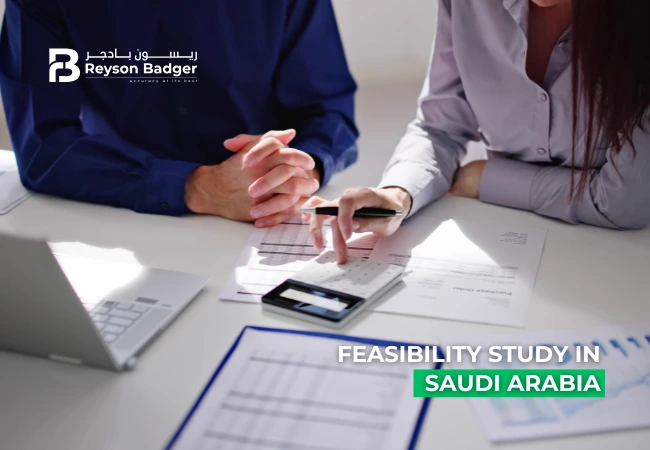
A feasibility study evaluates a proposed project to determine its practicality and likelihood of success. It helps assess the project's technical, financial, and operational viability, providing valuable insights for decision-making.
In Saudi Arabia, feasibility studies are critical due to the country’s rapidly evolving economy and diverse market opportunities. With ongoing efforts to diversify away from oil dependence and attract foreign investment, businesses must ensure their projects are aligned with local regulations and cultural expectations. A well-conducted feasibility study helps investors assess potential ventures, minimize risks, and enhance the chances of success. Here we will guide you through the process of conducting a feasibility study in Saudi Arabia, offering insights into the necessary steps, key considerations, and best practices to ensure your project’s success in the Kingdom.

Saudi Arabia's market presents an exciting opportunity for businesses, with one of the largest economies in the Middle East. Under Vision 2030, the kingdom is undergoing a radical transformation, shifting away from its dependence on oil exports and promoting private sector growth. With an economic structure valued at over $800 billion, Saudi Arabia offers promising opportunities in every sector.
While oil, gas, petrochemicals, and renewable energy continue to be the backbone of the economy, other sectors are experiencing significant growth, including finance, logistics, tourism, healthcare, education, and technology. The government’s focus on privatization and public-private partnerships has also opened the door to increased foreign investment.
However, entering the Saudi market requires a strong understanding of its cultural and regulatory landscape. Saudi Arabia adheres strictly to Islamic principles, which influence both business practices and social life. Labor laws are rigorous, and compliance with regulatory requirements is essential. Businesses must also be mindful of local customs, traditions, and gender segregation norms to ensure smooth operations and long-term success.
Conducting different types of feasibility studies can help ensure a project's success by evaluating its practicality in various areas.
Technical Feasibility Study
This study checks whether the project can be carried out with the available technology and resources.
What it looks at:
2. Financial Feasibility Study
This study examines whether the project makes financial sense.
What it looks at:
3. Market Feasibility Study
This study focuses on whether there is a demand for the product or service.
What it looks at:
4. Operational Feasibility Study
This study assesses how well the project can be managed with the current resources and structure.
What it looks at:
5. Economic Feasibility Study
This study looks at how the project will affect the economy.
What it looks at:
6. Social Feasibility Study
This study assesses how the project will impact society and the local community.
What it looks at:
7. Environmental Feasibility Study
This study focuses on the environmental impact of the project.
What it looks at:
8. Legal and Regulatory Feasibility Study
This study ensures the project complies with all legal and regulatory requirements.
What it looks at:
Define Project Scope and Objectives:
Gather Data and Conduct Research:
Analyze Data and Identify Potential Risks:
Evaluate Financial Viability:
Develop an Implementation Plan:
While considering aspects of running a feasibility study in Saudi Arabia, there are relevant points to be considered. The first is regulatory compliance with the state's government bodies, such as SAGIA (Saudi Arabian General Investment Authority) and MOCI (Ministry of Commerce and Investment), while also being in tune with the principles of Islamic finance and Shariah compliance. Equally important are the cultural and social dynamics of the region because they may affect the operations of a business and acceptance in the marketplace. Language and communication barrier considerations are also important aspects of proper navigation within the local business environment.
Conducting a feasible study in Saudi Arabia requires taking into account the regulations, Islamic finance, and Shariah compliance along with the cultural and social factors. Overcoming language and communication barriers forms an important aspect that needs to be worked upon for smooth business operations. Thus, such feasibility studies are of paramount importance to ensure such businesses function through the local market and regulatory landscape. With great knowledge of the Saudi market, Reyson Badger can guide the process accordingly.
If done well, a feasibility study becomes a must for businesses entering Saudi Arabia to establish themselves so that they have greater opportunities and fewer risks in the long run. It would be advisable to get professional help from firms like Reyson Badger to ensure all aspects are addressed in perfect order.